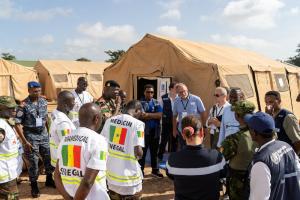Senegal becomes first African country to establish emergency medical team following WHO standards
Dakar – Senegal has become the first country in Africa to receive World Health Organization (WHO) classification for developing the capacity of its emergency medical team to be able to deploy and respond to health crises around the world, marking an historic milestone for the country and significantly boosting the African Region’s emergency response capacity.
The classification of Senegal’s Type 2 Emergency Medical Team (EMT) follows the international EMT standards. The country’s EMT is now deployable within 72 hours to autonomously provide medical and surgical care to up to 2500 patients impacted by health emergencies for a four-week period across the globe, follows a rigorous six-year process. EMT2 Senegal is the 49th classified team globally, with 130 others in process around the world.
“This certification is a real turning point that reflects the dedication of Senegal’s health authorities to ensuring a coordinated and rapid response to emergencies, both nationally and internationally, consolidating our position as a leader in health crisis management in Africa and beyond,” said Dr Ibrahima Sy, Senegal’s Minister of Health and Social Action, at the certification ceremony.
Since 2017, WHO in the African Region has provided intensive technical and financial support to the country, working closely with the Ministry of Health and Social Action, the Health Emergency Operations Centre, and Senegal’s Armed Forces Health Service. During this time, Senegal has already deployed teams to respond to health crises in the Democratic Republic of Congo, Sierra Leone and, most recently, Guinea. The recent establishment of the WHO Regional Emergency Hub has been instrumental in accelerating the finalization of certification process of the Senegal EMT.
“Congratulations to Senegal for this milestone achievement that contributes significantly to the region’s growing expertise in addressing public health emergencies,” said Dr Matshidiso Moeti WHO Regional Director for Africa. “Emergency medical teams are a crucial set of health workforce that greatly enhances the capacity of national health systems through rapid action to save lives in times of crises.”
EMTs can provide routine outpatient care, manage emergency and trauma cases, manage mass casualty incidents, outbreaks due to infectious diseases, and safely stabilize and refer patients for higher level care. In addition to clinical expertise, EMT team members are trained to work in the most challenging conditions, establishing field hospitals that are fully self-contained, limiting demands on local resources that may already be stretched in an emergency context.
The main aim of the EMT classification, which is overseen by WHO’s EMT Secretariat, is to improve the quality of care and professionalism of medical teams responding to disasters, conflicts, outbreaks and other emergencies. Populations benefit from the rapid arrival of well-trained EMTs, who support existing medical staff.
The classification is part of the wider vision encompassed in WHO’s Emergency Medical Teams 2030 strategy. This envisions a world in which every country can respond rapidly and effectively to national emergencies, leveraging regional and sub-regional capacities to support vulnerable communities and others in need.



